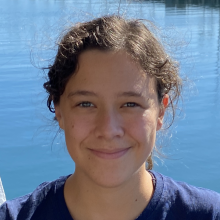
Erin Frates
Tell us about your work/research. What kinds of things do you do?
I am interested in using molecular approaches to better understand biological activity in the deep sea. At WHOI, I work with environmental DNA (eDNA) from the Ocean Twilight Zone in Annette Govindarajan’s laboratory. I assist with collecting seawater and extracting the eDNA from our samples; then, the data we generate can tell us about the animals that were in that area and can be used to assess biodiversity in the mesopelagic zone.
What sparked your initial interest in your career?
I’ve always had a fascination with the search for life elsewhere in the solar system, and as an undergraduate, I enrolled in a course that had a focus on astrobiology. During the class, a professor introduced me to deep-sea biology, and I found that much of what excites me about space science was shared with marine science- exploration, interdisciplinary work, and studying how life thrives in extreme environments. Within the year, I began working at the Graduate School of Oceanography, and my passion grew from there.
Who influenced you or encouraged you the most?
My professors, mentors, and peers have been my greatest supporters and motivators.
What element of your work/study do you think is the most fascinating?
I’m constantly amazed by how much information we gain from such seemingly inconspicuous samples. Much of the work done in a molecular ecology lab seems fairly intangible or abstract- you can’t quite observe the DNA that you’ve collected as you’re processing it. However, once we get the data, what we can learn about the ocean from our results is invaluable.
What other jobs led you to your current career?
My jobs as an undergraduate researcher have had the greatest influence on my career path. I was able to gain laboratory skills and field experience that have made me a more independent researcher and allowed me to hone in on which areas of science I want to pursue moving forward.
What are your degrees and certifications?
B.S. in Cell and Molecular Biology, Biochemistry - University of Rhode Island, 2020
What are your hobbies?
I love music, and play saxophone and trombone. I also enjoy traveling, cooking, and spending time outdoors.
How did you get involved with the Ocean Exploration Trust?
The laboratory group that I am a part of has developed a new underwater sampler. During the expedition, I’ll be learning to work with the sampler, which will be mounted on Mesobot (a newly-designed robot for studying the water column) and filters seawater in situ. We hope the data from these samples will help us to understand the diversity and behavior of animals that undertake daily vertical migrations from deeper depths in the day to shallower depths at night.
What advice would you give someone who wants to have a career like yours?
Be open to learning about other disciplines and trying new things! Oceanography is deeply collaborative, and you’re likely to have exciting opportunities to learn about many other fields, regardless of your own background.
Expeditions
Erin participated in the following Ocean Exploration Trust expeditions:
